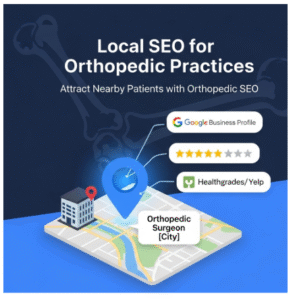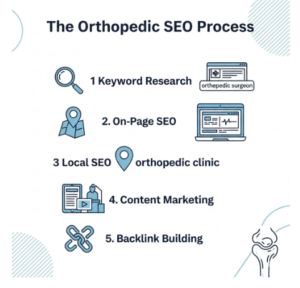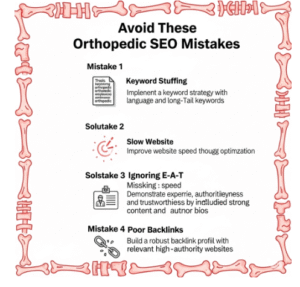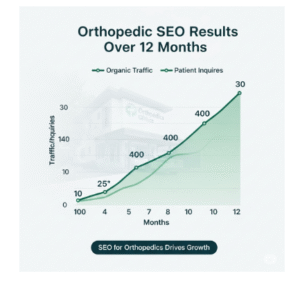Key Takeaways
- Keyword research helps attract high-intent patients actively seeking care.
- Optimizing your website’s meta tags, headers, and content boosts rankings.
- Google Business Profile is essential for capturing “near me” searches.
- Long-form, patient-focused content builds trust and drives organic traffic.
- Mobile-friendly and fast-loading websites improve user experience and SEO.
- Earning backlinks from reputable health sources strengthens authority.
- Video content and FAQs support engagement and voice search optimization.
- Tracking key metrics like traffic, conversions, and bounce rate guides strategy.
- Consistent SEO efforts lead to increased bookings and long-term growth.
SEO For Orthopedic Surgeons
SEO for orthopedics is the process of optimizing your orthopedic practice’s website to rank higher on search engines like Google, making it easier for potential patients to find you. Orthopedic SEO involves using targeted keywords, improving website structure, and creating valuable content to drive organic traffic. Whether you’re a solo surgeon or part of a large clinic, Orthopedic SEO can increase your online visibility, build trust with patients, and help you outrank competitors. From understanding basic keyword research to leveraging advanced local SEO tactics, this guide covers everything you need to grow your practice online.
Why Orthopedic SEO Matters for Orthopedic Surgeons
Orthopedic SEO is important because most patients now search online for healthcare providers. According to Google, searches for “orthopedic near me” have increased by 20% annually, showing that patients rely on search engines to find specialists. SEO for orthopedics helps your practice appear on the first page of Google, where 75% of users click. For beginners, Orthopedic SEO is a cost-effective way to market your practice compared to traditional advertising. For advanced users, it offers a high ROI by driving qualified leads—patients actively seeking your services. By outranking competitors, you establish authority and attract more appointments.
Keywords Research in Orthopedic SEO
SEO for orthopedics begins with keyword research, the foundation of attracting the right patients. Orthopedic SEO relies on two types of keywords: short-tail (e.g., “orthopedic surgeon”) and long-tail (e.g., “best orthopedic surgeon for knee replacement in Miami”). Short-tail keywords are broad, with high search volume but fierce competition. Long-tail keywords are specific, easier to rank for, and attract patients with clear intent. For beginners, start by brainstorming terms patients might search, like “joint pain specialist.” For advanced users, tools like SEMrush or Ahrefs can analyze search volume, competition, and keyword difficulty. For example, “minimally invasive spine surgery” might have a search volume of 500 and low competition, making it a prime target.
Steps for Keyword Research:
- Use Google Keyword Planner for free insights into search volume.
- Identify long-tail keywords with tools like Ahrefs or Ubersuggest.
- Analyze competitors’ keywords using SEMrush’s “Keyword Gap” tool.
- Prioritize keywords with high intent (e.g., “orthopedic surgeon near me”).
On-Page SEO for Orthopedic Websites
Orthopedic SEO relies on on-page optimization to make your website search-engine-friendly. SEO for orthopedics includes optimizing meta titles (e.g., “Best Orthopedic Surgeon in Chicago | [Practice Name]”), meta descriptions, and headers (H1, H2) with keywords. For beginners, ensure your content answers patient questions, like “What is ACL surgery?” Use keywords naturally in paragraphs and include images with alt text (e.g., “orthopedic knee surgery diagram”). For advanced users, implement schema markup, like “Physician” schema, to enhance search result snippets. Optimize content length—aim for 1,500+ words for in-depth pages—and use internal links to guide users to related services.
On-Page SEO Checklist:
- Write unique meta titles (60 characters) and descriptions (160 characters).
- Use H1 for main titles and H2/H3 for subheadings with keywords.
- Add alt text to images (e.g., “orthopedic surgeon performing surgery”).
- Include internal links to service pages (e.g., “Learn more about joint replacement”).
Local SEO for Orthopedic Surgeons
SEO for orthopedics is incomplete without local SEO, which targets patients in your area. Orthopedic SEO through local optimization ensures your practice appears in “near me” searches, like “orthopedic surgeon Denver.” For beginners, claim and optimize your Google Business Profile (GBP) with accurate details: name, address, phone number (NAP), and photos of your clinic. Add services like “knee replacement” and encourage patient reviews. For advanced users, ensure NAP consistency across directories (e.g., Healthgrades, Yelp). Build local backlinks by guest posting on community health blogs or sponsoring local sports teams. Monitor reviews and respond professionally to build trust.
Local SEO Tips:
- Optimize GBP with keywords like “orthopedic surgeon [city].”
- List your practice on directories like Healthgrades and Vitals.
- Respond to all reviews, positive or negative, within 24 hours.
- Create location-specific pages (e.g., “Orthopedic Services in Miami”).

Content Marketing for Orthopedic SEO
Orthopedic SEO thrives on content marketing, which educates patients and boosts rankings. SEO for orthopedics involves creating blog posts, videos, and infographics that answer patient questions, like “How to recover from rotator cuff surgery.” For beginners, write 800–1,200-word blogs with keywords and patient-friendly language. Topics like “5 Tips for Knee Pain Relief” attract readers. For advanced users, perform a content gap analysis using Ahrefs to find topics competitors cover (e.g., “minimally invasive joint surgery”) but you don’t. Create skyscraper content—longer, more detailed articles (2,000+ words)—to outrank competitors.
Content Ideas:
- Blog: “What to Expect During Hip Replacement Surgery”
- Video: “Tour of Our Orthopedic Clinic in [City]”
- Infographic: “Common Sports Injuries and Treatments”
- Whitepaper: “Advances in Minimally Invasive Orthopedic Surgery”
Off-Page SEO and Backlinks for Orthopedics
SEO for orthopedics extends beyond your website with off-page SEO, primarily through backlinks. Orthopedic SEO benefits from backlinks—links from other websites to yours—which signal authority to Google. For beginners, aim for backlinks from reputable sites, like local healthcare directories or medical associations. A link from the American Academy of Orthopaedic Surgeons is gold. For advanced users, use guest posting on health blogs (e.g., “Top 10 Knee Surgery Recovery Tips”) or broken link building—find broken links on medical sites and offer your content as a replacement. Tools like Moz’s Link Explorer track backlink quality.
Link-Building Strategies:
- Submit your site to medical directories like Healthgrades.
- Guest post, Digital PR on local health blogs with keywords like “orthopedic care.”
- Partner with local sports teams for backlinks from their websites.
- Use Ahrefs to find competitors’ backlinks and replicate them.
Technical SEO for Orthopedic Websites
Orthopedic SEO requires technical SEO to ensure your website performs well. SEO for orthopedics includes optimizing site speed (aim for under 3 seconds) and mobile-friendliness, as 60% of searches are mobile. For beginners, use Google’s PageSpeed Insights to identify issues, like large images slowing your site. Ensure your site is secure with an SSL certificate (HTTPS). For advanced users, improve crawlability by submitting an XML sitemap via Google Search Console. Fix broken links and use clean URLs (e.g., “/orthopedic-services/knee-surgery”). Tools like Screaming Frog help audit technical issues.
Technical SEO Checklist:
- Test site speed with Google PageSpeed Insights.
- Ensure mobile responsiveness with Google’s Mobile-Friendly Test.
- Submit an XML sitemap to Google Search Console.
- Use HTTPS and fix broken links with Screaming Frog.
Competitor Analysis for Orthopedic SEO
SEO for orthopedics involves studying competitors to identify opportunities. Orthopedic SEO benefits from analyzing competitors’ keywords, content, and backlinks. For beginners, visit competitors’ websites (e.g., a rival orthopedic clinic) and note their page titles, headers, and blog topics. Use Google’s “site:competitor.com” search to see indexed pages. For advanced users, SEMrush’s Domain Overview reveals competitors’ top keywords (e.g., “spine surgeon [city]”) and traffic sources. Analyze backlinks with Ahrefs to find link-building opportunities, like guest posts on sites linking to competitors.
Competitor Analysis Steps:
- List 3–5 local orthopedic competitors.
- Check their keywords with SEMrush or Ubersuggest.
- Review their content for gaps (e.g., missing “ACL recovery tips”).
- Analyze backlinks with Ahrefs to replicate high-quality links.
Measuring Orthopedic SEO Success
Orthopedic SEO success requires tracking performance to refine strategies. SEO for orthopedics uses tools like Google Analytics to monitor website traffic and Google Search Console to track keyword rankings. For beginners, set up Analytics to see how many visitors come from organic search and which pages they visit (e.g., “knee surgery services”). Check Search Console for impressions and clicks on “orthopedic surgeon [city].” For advanced users, focus on KPIs: organic traffic growth (aim for 10–20% monthly), bounce rate (below 50%), and conversion rates (e.g., appointment form submissions). Tools like SEMrush track keyword position changes over time.
Tracking Tools:
- Google Analytics: Monitor traffic and user behavior.
- Google Search Console: Track keyword performance and clicks.
- SEMrush: Analyze keyword rankings and competitor data.
- Hotjar: Use heatmaps to see how patients interact with your site.
How We Help Orthopedic Doctors Grow Their Practice and See Increased Leads

SEO for orthopedics is the key to growing your practice and attracting more patients. Orthopedic SEO drives targeted traffic by optimizing your website for searches like “orthopedic surgeon near me,” ensuring patients find you first. Our tailored strategies include keyword research to target high-intent terms like “knee replacement specialist,” local SEO to dominate “near me” searches via Google Business Profile, and content marketing with patient-focused blogs like “Recovering from ACL Surgery.” We also build high-quality backlinks from medical and local sites to boost your authority. As seen in our case studies, a solo surgeon in Austin doubled inquiries in six months, while a Miami practice saw a 25% booking increase. Orthopedic SEO enhances credibility, improves rankings, and delivers measurable ROI. Whether you’re new to SEO or seeking advanced tactics like schema markup, we customize solutions for your practice. Don’t let competitors outrank you—partner with us to maximize leads and grow your patient base. Contact us today for a free SEO audit and start your Orthopedic SEO journey!
Case Studies: Orthopedic SEO Success Stories
SEO for orthopedics delivers measurable results, as shown in these real-world examples. Orthopedic SEO transforms practices of all sizes by increasing visibility and patient bookings. Below are case studies highlighting strategies and outcomes.
Case Study 1: Solo Orthopedic Surgeon in Austin
Background: Dr. Jane Smith, a solo orthopedic surgeon, struggled to attract local patients online.
SEO for Orthopedics Strategies:
- Optimized Google Business Profile with “orthopedic surgeon Austin” keywords and patient reviews.
- Created a blog series on “Knee Pain Treatments” targeting long-tail keywords.
- Built backlinks from local health blogs via guest posts.
Results: Within 6 months, organic traffic increased by 150%, and monthly patient inquiries doubled from 10 to 20.
Lessons Learned: Orthopedic SEO, even on a small scale, thrives with local optimization and consistent content. Beginners can start with GBP and simple blogs.
Case Study 2: Small Orthopedic Clinic in Denver
Background: A 5-doctor clinic wanted to compete with larger practices in Denver.
Orthopedic SEO Strategies:
- Implemented local SEO with NAP consistency across Healthgrades and Yelp.
- Published skyscraper content (2,500 words) on “Minimally Invasive Spine Surgery.”
- Used schema markup to enhance search snippets.
Results: Ranked #1 for “Denver orthopedic clinic” within 9 months, with a 200% increase in organic traffic and 30% more appointments.
Lessons Learned: SEO for orthopedics requires advanced tactics like schema and long-form content to outrank competitors. Advanced users should focus on technical SEO.
Case Study 3: Large Orthopedic Practice in Miami
Background: A multi-location practice aimed to dominate regional searches.
SEO for Orthopedics Strategies:
- Created location-specific pages for each clinic (e.g., “Orthopedic Services Miami Beach”).
- Built high-quality backlinks from medical associations and local sports teams.
- Used SEMrush for competitor keyword analysis to target “hip replacement Miami.”
Results: Achieved a 300% increase in organic traffic and a 25% boost in patient bookings across locations in 12 months.
Lessons Learned: Orthopedic SEO scales with location pages and strategic backlinks. Advanced users benefit from competitor analysis tools.
Emerging Trends in Orthopedic SEO
SEO for orthopedics is evolving with trends like voice search, AI, and video content. Orthopedic SEO must adapt to voice search, as patients ask Siri or Alexa, “Who’s the best orthopedic surgeon near me?” Optimize for conversational long-tail keywords (e.g., “What’s the recovery time for ACL surgery?”). For beginners, create FAQ pages to answer voice queries. For advanced users, use AI tools like Jasper to generate patient-friendly content or Google’s RankBrain insights to optimize for user intent. Video content, like “Day in the Life of an Orthopedic Surgeon,” boosts engagement and rankings. Embed videos on service pages and optimize with keywords in titles and descriptions.
Future-Proofing Tips:
- Create FAQ pages for voice search queries.
- Use AI tools to scale content creation.
- Produce videos for YouTube and embed on your site.
- Stay updated on Google algorithm changes via Moz or Search Engine Journal.
Common Orthopedic SEO Mistakes to Avoid
SEO for orthopedics can fail if you make common mistakes. Orthopedic SEO suffers from keyword stuffing—overusing terms like “orthopedic surgeon” in content, which Google penalizes. For beginners, write naturally and aim for 1–2% keyword density. Another mistake is neglecting mobile optimization; a slow, non-responsive site drives patients away. Test with Google’s Mobile-Friendly Test. For advanced users, ignoring E-A-T (Expertise, Authoritativeness, Trustworthiness) harms rankings. Showcase your credentials (e.g., “Board-Certified Orthopedic Surgeon”) and earn backlinks from medical sites. Avoid low-quality backlinks from spammy directories, as they hurt credibility.
Mistakes to Avoid:
- Keyword stuffing: Use keywords sparingly and naturally.
- Slow site: Optimize images and use a fast host like WP Engine.
- Ignoring E-A-T: Highlight surgeon credentials and patient testimonials.
- Poor backlinks: Focus on quality over quantity.

Conclusion
SEO for orthopedics is your key to attracting more patients, outranking competitors, and growing your practice. Orthopedic SEO combines keyword research, on-page optimization, local SEO, and content marketing to boost your online presence. Whether you’re new to SEO or ready for advanced strategies like AI-driven content, this guide provides everything you need. Start today by auditing your website with Google’s free tools or partnering with an Orthopedic SEO expert to maximize results. Don’t let competitors steal your patients—take control of your online visibility now.

FAQs About Orthopedic SEO
- What is SEO for orthopedics?
SEO for orthopedics optimizes your website to rank higher on Google for searches like “orthopedic surgeon near me,” driving more patient traffic. - How long does Orthopedic SEO take to show results?
Orthopedic SEO typically takes 3–6 months for noticeable results, but consistent efforts can yield rankings within weeks for low-competition keywords. - What keywords should I target for Orthopedic SEO?
Target long-tail keywords like “best orthopedic surgeon for hip replacement in [city]” or “ACL surgery recovery tips” for high-intent patients. - How does local SEO help my orthopedic practice?
Local SEO ensures your practice appears in “near me” searches, like “orthopedic clinic Denver,” attracting nearby patients via Google Business Profile. - Can I do Orthopedic SEO myself?
Yes, but it requires time and tools like SEMrush. Beginners can optimize GBP, while advanced users can tackle backlinks and technical SEO. - Why is content important for SEO for orthopedics?
Content like blogs on “knee pain treatments” educates patients, builds trust, and improves rankings by targeting relevant keywords. - What tools are best for Orthopedic SEO?
Use Google Analytics for traffic, SEMrush for keywords, and Screaming Frog for technical audits to enhance your Orthopedic SEO strategy.
